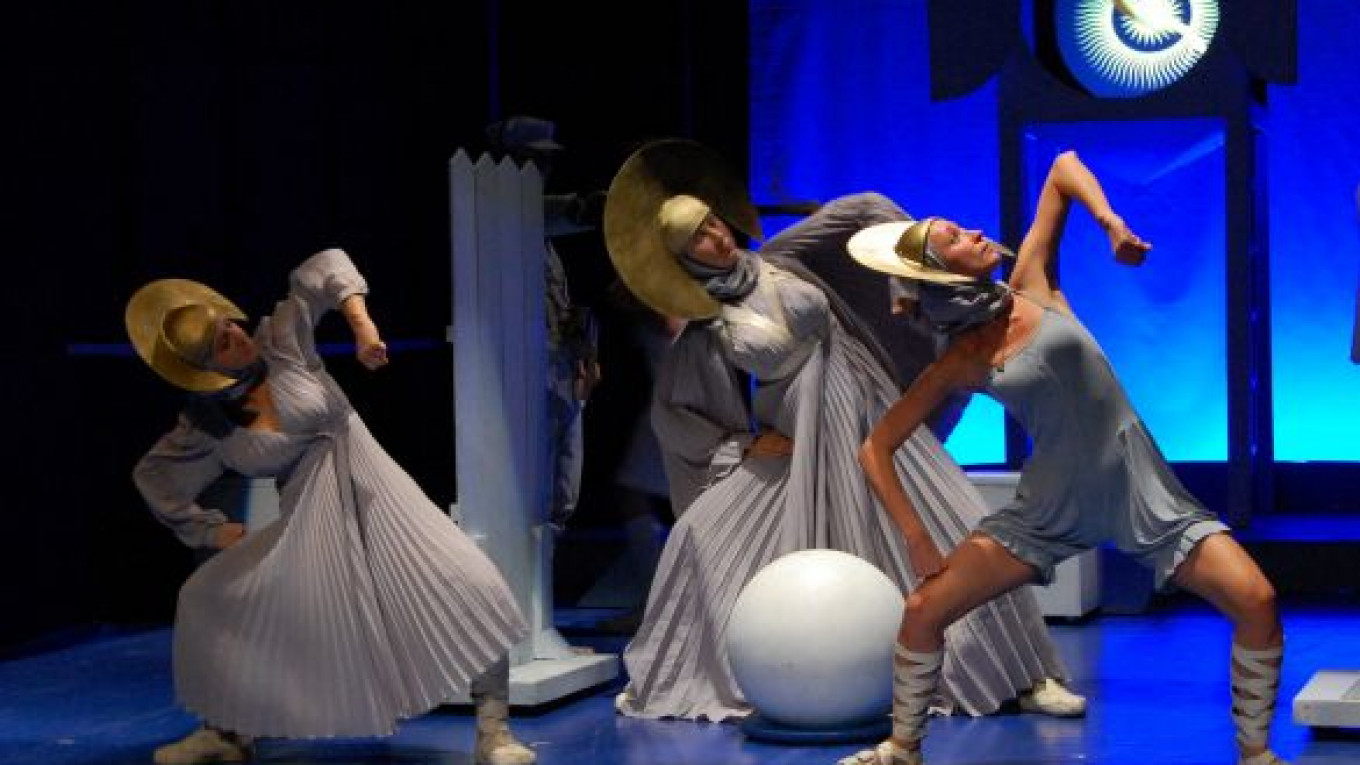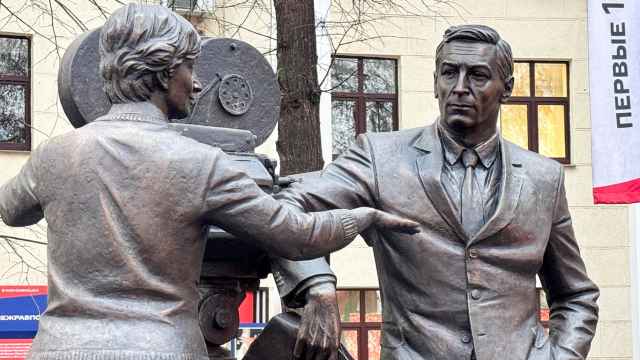Pavel Pryazhko’s “The Field” at the Contemporary Play School is one odd duck of a play. And you can say that twice about the mystical, mock-futuristic production that Filipp Grigoryan made of it.
The opening-night crowd last week was clearly nonplused. Only rarely did anyone laugh or even chuckle, although Pryazhko and Grigoryan both bent over backward to make things funny. When the performance ended, the applause barely kept the bows going long enough for the whole company to walk out on stage. I saw plenty of quizzical faces on people filing out of the theater.
But mark my word, if the right audience aligns itself with this show, it could be the cult hit of the season.
Bizarre is probably the catchall phrase to describe “The Field.” Wonderfully and aggressively bizarre.
Pryazhko, since writing his first play in 2004 and debuting in Moscow with a production of “Panties” at Teatr.doc in 2007, has become one of the hottest writers in the Russian language. Hailing from Minsk, Belarus, he creates his plays with an intriguingly detached voice. His characters are removed from their own emotions even as, or perhaps because, they are totally immersed in the minutiae of their lives.
In “The Field,” Pryazhko explores an “event” that is belligerently absurd. As kolkhoz workers go about their daily business of plowing, buying sugar at the store, giving their girlfriends gifts, preparing to go to the disco dance (or not), or battling with dead cell phone batteries, they suddenly realize that they made a horrible mistake — they drove their tractors too far west and plowed their way right into Europe.
Forget any notion of political connotations here. This is strictly for fun. If anything is left these days of the Soviet genre of village literature, Pryazhko just put it out of its misery. His martini-dry, whacked-out tale of farmers on the loose looks very much like the absolute end of the line.
After this, there is nowhere else to go.
That may be why Grigoryan took this topsy-turvy play and turned it on its metaphysical end. What else are you going to do with something like this? You sure can’t play it straight.
As I sat watching this strange performance unfold I came up with a running list of possible antecedents. Clearly, the costumes by Galya Solodovnikova and Grigoryan’s set owe a debt to the constructivist theater designs of Alexandra Ekster in the 1910s, as well as her work on the famous sci-fi movie “Aelita.”
But is it possible that the weirdly spinning video sun is quoted from The Beatles’ movie “Help!”? How about connections to Woody Allen’s “Sleeper”? Vladimir Voinovich’s novel “The Life and Extraordinary Adventures of Private Ivan Chonkin”? Jules Verne’s tales?
Every spectator having the patience and wisdom to stick with this show will discover his or her own references. The specifics aren’t the point. What’s important is that Grigoryan, taking a work steeped in Slavic rural life, created a wildly tongue-in-cheek performance that is quite cosmopolitan.
Grigoryan has his entire cast play the piece with dead seriousness, while choreographer Anna Abalikhina keeps everyone moving in smooth synchronicity. Tractor drivers march about the stage wielding machine-gun-like sickles. Milkmaids cuss back at their men with self-assured indifference. A young man sets off at a trot that brings all other action to halt as he circles — and circles and circles — the stage with an impenetrable, granite expression on his face.
What is this all about?
Well, the show begins with a long, wordless prologue in which we see something like the “origins of the future” — a series of vignettes of beings transforming into humans. They are “born” in prison garb and, sure enough, soon find themselves living in prison-like situations. An evil guard dog keeps watch as they eagerly beat and abuse one another.
These people, a woman suggests in the play’s first spoken words, exist in the universe to “understand” themselves.
By all appearances, the futuristic characters of the latter scenes are still struggling to do that, even though they have surrounded themselves with an impressive array of technological contraptions.
For years now, the only “accepted” method of staging contemporary drama has been to do it simply and with as few frills as possible. In “The Field,” Grigoryan makes mincemeat of that unwritten rule.
This is a strange, affecting, unexpectedly funny performance about the way the human species combines utter incompetence and stupidity with the grandest, most solemn aspirations.
“The Field” (Pole) plays Oct. 7 and 27 at 7 p.m. at the Contemporary Play School, located at 29/14 Neglinnaya Ulitsa. Metro Trubnaya, Tsvetnoi Bulvar. Tel. 694-0756, www.neglinka29.ru. Running time: 1 hour, 15 minutes.
A Message from The Moscow Times:
Dear readers,
We are facing unprecedented challenges. Russia's Prosecutor General's Office has designated The Moscow Times as an "undesirable" organization, criminalizing our work and putting our staff at risk of prosecution. This follows our earlier unjust labeling as a "foreign agent."
These actions are direct attempts to silence independent journalism in Russia. The authorities claim our work "discredits the decisions of the Russian leadership." We see things differently: we strive to provide accurate, unbiased reporting on Russia.
We, the journalists of The Moscow Times, refuse to be silenced. But to continue our work, we need your help.
Your support, no matter how small, makes a world of difference. If you can, please support us monthly starting from just $2. It's quick to set up, and every contribution makes a significant impact.
By supporting The Moscow Times, you're defending open, independent journalism in the face of repression. Thank you for standing with us.
Remind me later.







